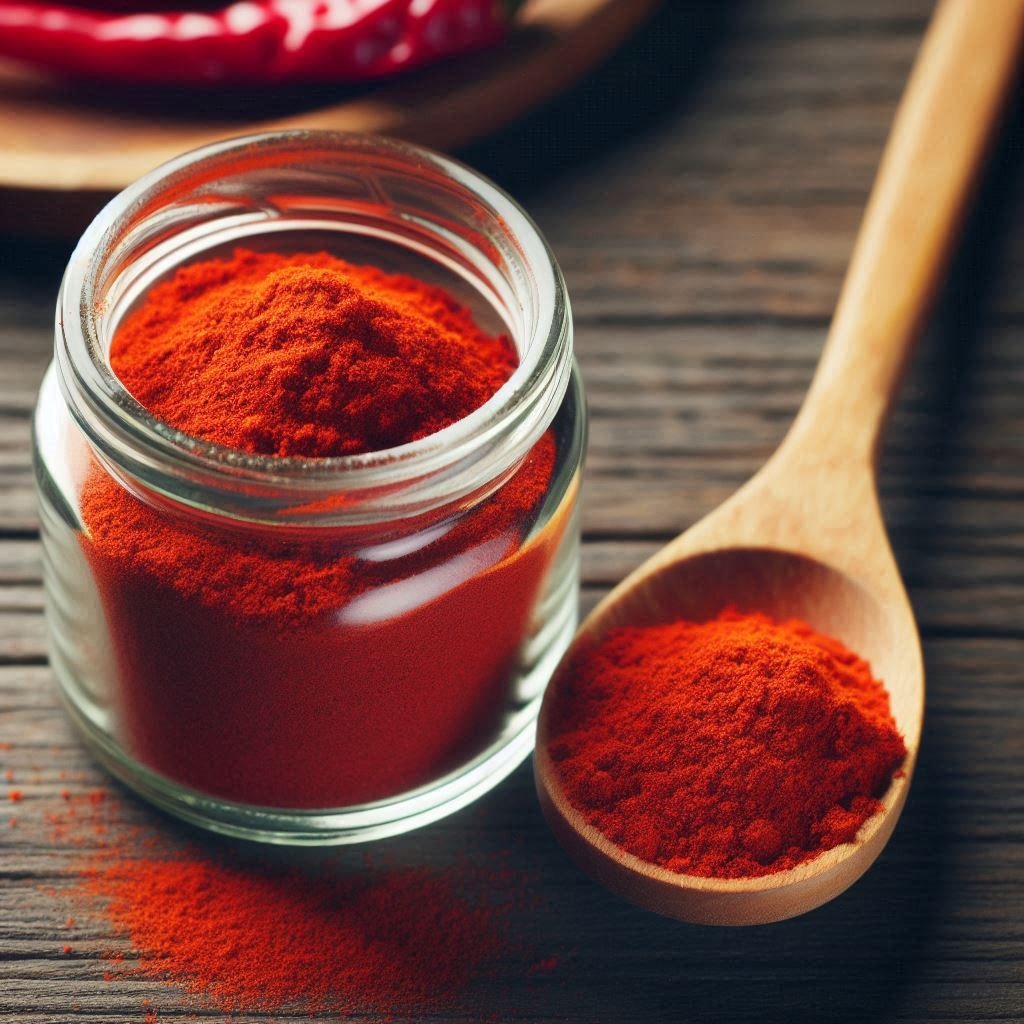Let me tell you something—cayenne pepper isn’t just that spice sitting on your kitchen shelf. It’s a game-changer, a straight-up powerhouse in the world of natural healing.
When I say, herbal remedies cayenne, I’m talking about a spice that does way more than just bring the heat to your food.
This bad boy can help you boost your metabolism, relieve pain, and improve your overall health in ways you probably never imagined.
In this article, I’m going to cover how you can use cayenne pepper as a natural remedy. Plus, I’m including some super simple step-by-step recipes and tips on when and how often to use them. And listen, these aren’t just theories. In the next article in this series, I’m sharing real-life case studies that prove just how effective cayenne pepper can be in transforming your health and well-being. So, stay tuned!
Why Herbal remedies with cayenne are a game-changer
Cayenne pepper is a potent tool in natural healing that has the power to transform your health. Derived from dried chili peppers, cayenne is rich in capsaicin, a compound that’s been shown to have significant effects on human physiology. Capsaicin works by stimulating circulation, boosting metabolism, and even aiding in pain relief by blocking certain pain signals to the brain.
This isn’t just about adding flavor; it’s about harnessing the benefits of a spice that can positively impact your overall wellness.
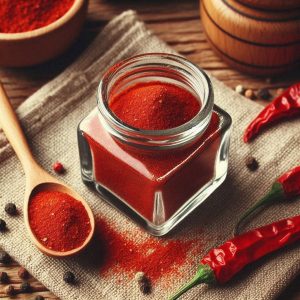
The real beauty of cayenne pepper lies in its versatility. Whether you’re looking to support weight loss, improve digestion, or ease muscle soreness, cayenne pepper can be a key ingredient in your natural healing toolkit. It can be used in various forms—consumed in drinks, added to meals, or even applied topically. With herbal remedies using cayenne, you’re not just treating symptoms; you’re truly enhancing your body’s ability to heal and thrive.
What makes cayenne Pepper a must-Have herbal remedy
Cayenne pepper shines in holistic medicine because of its incredible range of health benefits and its natural potency.
At the heart of this fiery spice is capsaicin, the compound responsible for its heat and its healing properties. Capsaicin boosts metabolism, which can help with weight management, and it improves blood circulation, delivering more oxygen and nutrients throughout your body.
This makes cayenne pepper not just a spice, but a powerful agent for overall wellness.
What really sets cayenne pepper apart is its ability to address multiple health issues naturally and quickly.
- It’s a go-to remedy for pain relief, especially in conditions like arthritis or muscle soreness, because it blocks pain signals.
- It supports digestive health, aiding in the breakdown of food and reducing issues like bloating.
- It’s an excellent vasodilator!
- In holistic medicine, cayenne pepper is valued not just for treating symptoms, but for supporting the body’s natural healing processes, making it a true star in the world of natural remedies.
Now let’s get into some simple remedies you can start today.
Simple and effective Herbal Remedies with Cayenne Pepper
Cayenne pepper detox drink
This drink is perfect for kickstarting your day, metabolism, and more!
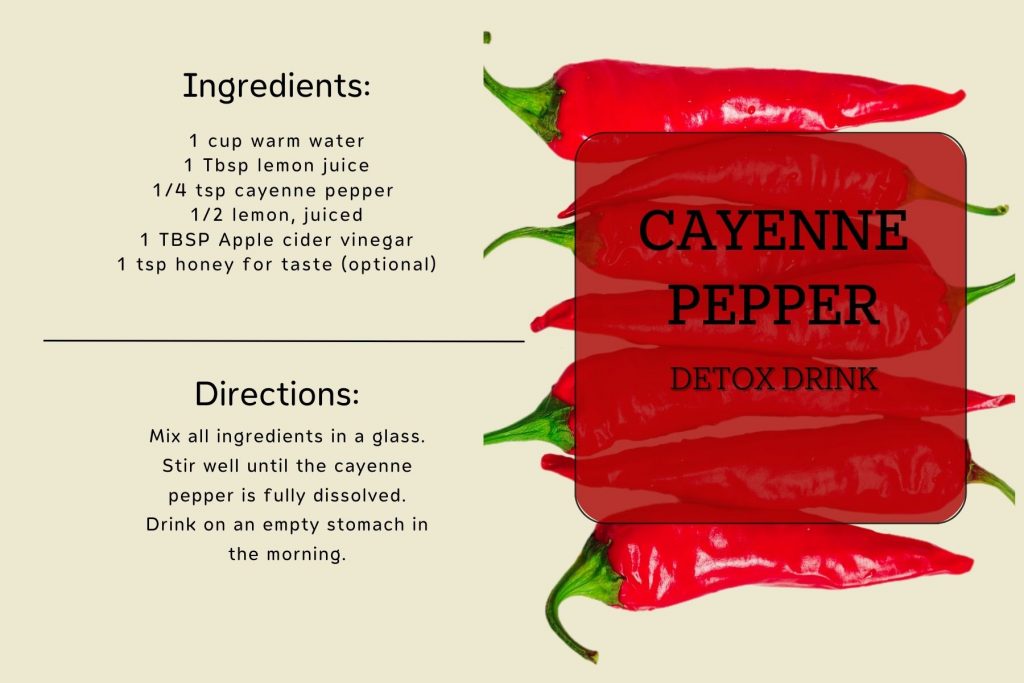
Cayenne Ginger Tea
This cayenne tea is ideal for supporting digestive health and relieving indigestion
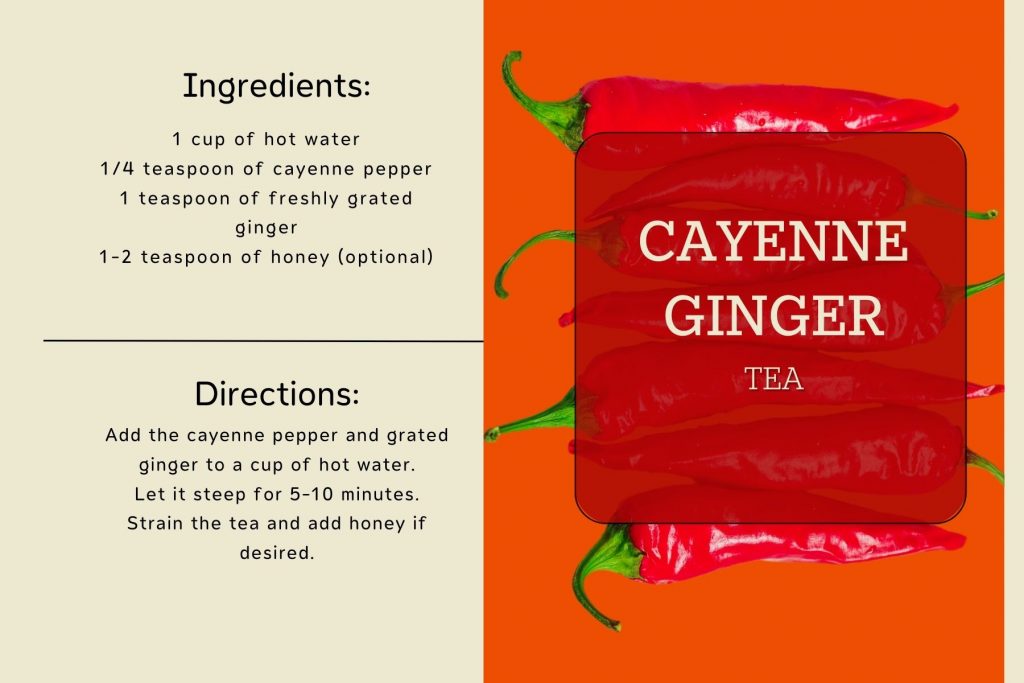
Pain Salve
This topical salve is great for soothing sore muscles and joint pain.
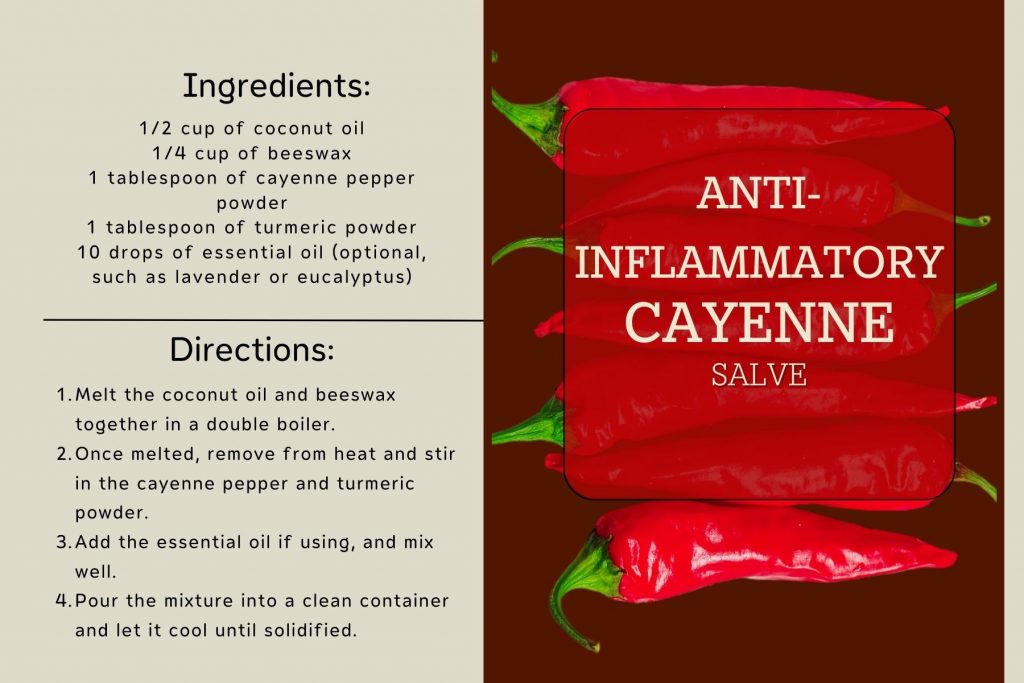
When and How Often to Use Cayenne Pepper Remedies
Daily Consumption Guidelines
For most individuals, a small daily dose of cayenne pepper, around 1/4 to 1/2 teaspoon provides significant health benefits. Whether you’re adding it to your food, consuming it in a drink, or applying it topically, consistency is key. Start with small amounts and gradually increase as your body adapts to the spice.
When to Use Cayenne Remedies
- Morning Boost: Kick off your day with a cayenne pepper detox drink. It’s a fantastic way to get your metabolism firing on all cylinders and give your system a good cleanse.
- After Meals: A cup of cayenne and ginger tea after eating is a game-changer for digestion. It helps keep things moving smoothly and can prevent that uncomfortable bloated feeling.
- Evening Wind-Down: Before you hit the hay, try applying a cayenne salve. It’s a perfect way to soothe any aches and pains from the day and help you relax into the evening.
Common mistakes to avoid when using herbal remedies with cayenne
When it comes to herbal remedies with cayenne, getting the most out of this powerful spice means knowing what to avoid.
One common mistake is overdoing it with cayenne. Let’s not. While it’s tempting to think that more is better, you’ll soon learn that is not the case here!
Too much cayenne can actually irritate your digestive system or cause skin discomfort when applied topically. Start with small amounts and gradually increase the amount as your body adjusts.
Another mistake is not being consistent. Herbal remedies with cayenne work best when used regularly, whether you’re adding it to your meals, sipping on a detox drink, or applying it as a salve. Inconsistent use won’t give your body the full benefits, but it’s magnificent in certain emergencies.
Lastly, make sure you’re storing your cayenne pepper properly. Exposure to light and moisture can diminish its potency. Keep it in a cool, dark place to ensure it remains as effective as possible. By avoiding these common mistakes, you can fully harness the health-boosting power of cayenne pepper in your natural healing routine.
Who Should Avoid Cayenne Pepper Remedies?
Cayenne pepper may not be suitable for everyone. Individuals with sensitive stomachs, ulcers, or gastrointestinal issues should use cayenne pepper with caution. Pregnant or breastfeeding women and those on blood thinners or other medications should consult a healthcare provider before using cayenne pepper remedies.
Potential Interactions and Side Effects
Cayenne pepper can interact with certain medications, including blood thinners and ACE inhibitors. Side effects may include stomach irritation, heartburn, and, in rare cases, allergic reactions. Always start with a small dose to assess your body’s tolerance.
How to Know If You’re Sensitive to Herbal Remedies with Cayenne
If you’re wondering whether you might be sensitive or allergic to capsaicin, the active compound in cayenne pepper and other hot peppers, there are a few signs to watch out for.
Signs of Capsaicin Sensitivity or Allergy

- Skin Irritation: If you apply a product containing capsaicin to your skin and notice redness, itching, or a burning sensation that doesn’t subside, you could be sensitive to it. In more severe cases, you might develop hives or a rash.
- Gastrointestinal Issues: Consuming foods with capsaicin can sometimes lead to stomach pain, cramps, or diarrhea. If these symptoms occur frequently after eating spicy foods, you might have a sensitivity.
- Respiratory Symptoms: Some people experience coughing, sneezing, or a runny nose when exposed to capsaicin. In rare cases, capsaicin can cause more serious respiratory issues, such as difficulty breathing or asthma-like symptoms, which could indicate an allergic reaction.
- Swelling: Allergic reactions to capsaicin can cause swelling of the lips, tongue, throat, or face. This is a more serious symptom that requires immediate medical attention.
- Anaphylaxis: In extremely rare cases, capsaicin can trigger anaphylaxis, a life-threatening allergic reaction that causes severe difficulty breathing, a drop in blood pressure, and loss of consciousness. This is a medical emergency.
What to Do If You Suspect an Allergy or Sensitivity
If you notice any of these symptoms after consuming or using products with capsaicin, stop using them immediately. For mild reactions, over-the-counter antihistamines might help. However, if you experience severe symptoms like swelling or difficulty breathing, seek medical attention right away.
To confirm an allergy or sensitivity, you can consult a healthcare provider. They may recommend an allergy test or suggest that you keep a food diary to track your reactions to spicy foods.
It’s always better to be safe than sorry, so if you’re in doubt, talk to your doctor to get a proper diagnosis.

